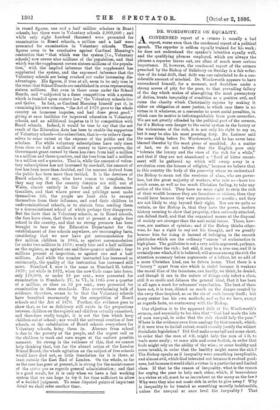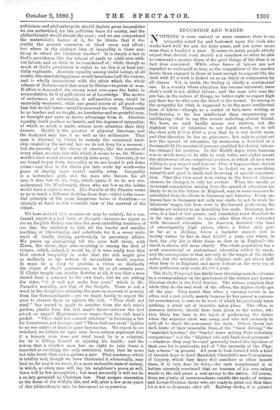DR. WORDSWORTH ON EQUALITY.
ACONDENSED report of a sermon is usually a bad report, worse even than the condensed report of a political speech. The reporter is seldom equally trained for his work ; he does not understand the speaker's intention equally well, and the qualifying phrases employed, which are always the phrases a reporter leaves out, are often of much more serious importance. If, however, the condensed report of the sermon preached by the Bishop of Salisbury on Sunday is a fair reflec- tion of its total drift, that drift was one calculated to do a con- siderable amount of mischief. Dr. Wordsworth appears to have surrendered himself, for a moment, and doubtless under a strong access of pity for the poor, to that prevailing fallacy of the day which makes of alms-giving the most peremptory of duties, treats inequality of condition as a positive evil, and ruins the charity which Christianity enjoins by making it either an obligation of mere justice, in which case there is no virtue in it whatever, or a surrender to avert social penalties, in which case its motive is indistinguishable from pure cowardice. We are not greatly offended by the political part of the sermon, for if a Bishop sees danger to the social system in the luxury or the viciousness of the rich, it is not only his right to say so, but it may be also his most pressing duty. Dr. Latimer said the same thing before Dr. Wordsworth, and he has never been blamed therefor by the most pions of mankind. As a matter of fact, we do not believe that the English poor only "tolerate the luxury and the vices of the rich for a while," and that if they are not abandoned a " flood of bitter resent- ment will be gathered up which will sweep away in a revolution even the houses of religion," because we believe that in this country the body of the poor—by whom we understand the Bishop to mean not the receivers of alms, who are power- less, but the great majority of workers, who rule us—have too much sense, as well as too much Christian feeling, to take any action of the kind. They have no more right to strip the rich of their wealth because they are luxurious or vicious, than they would have because they were penurious or ascetic ; and they are not likely to step beyond their right. Nor are we quite so certain, as the Bishop is, that they have the power, modern history seeming to show that property, when seriously attacked, can defend itself, and that the organised means at the disposal of society are stronger than the anti-social forces. These, how- ever, are matters of opinion ; and if the Bishop thinks other- wise, he has a right to say out his thought, and we greatly honour him. for doing it instead of indulging in the smooth platitudes which are the ordinary "snares " of ecclesiastics in high place. The guillotine is not a very noble argument, perhaps, to put before the rich ; but still, it may be a tree one, and it is certainly one which,if it is believed, will arouse among the rich the attention necessary before arguments of a loftier, let us add of a more Christian kind, can be driven home. That there is a " luxury " apart from vice which is sinful because it weakens the moral fibre of the luxurious, can hardly, we think, be denied, and though it can in the nature of things only infect a class, still it so spoils and debases the general ideal, that it has been in all ages a mark for reformers' reprobation. The best of them have not, it is true, dilated so much on the danger created by the envy thus inspired, as on the sin of such luxury itself ; but every orator has his own methods, and so far we have, except as regards facts, no controversy with the Bishop.
Oar objection is to the apparent drift of Dr. Wordsworth's sermon, and especially to his idea that " God had made the lots of men unequal, in order that the rich should help the poor." Where is the evidence even from analogy for that remark, which, if it were true to its full extent, would morally justify the wildest Socialistic legislation ? Did God make some tall and some short, in order that the men of 6 ft. might help the men of 5 ft. to wade more easily ; or some able and some foolish, in order that fools might rely on the ability of the wise ; or some healthy and some invalid, in order that the healthy might nurse the sick ? The Bishop speaks as if inequality were something inexplicable, and almost evil, which God tolerated not because it evolved good- ness, but because it would elicit a virtue in a particular and limited class. If that be the reason of inequality, what is the reason for urging the poor to help each other, which, if benevolence is a virtue at all, mast be as incumbent on the many as the few P Why were they also not made rich in order to give away ? Why is inequality to be treated as something morally indefensible, unless the unequal at once level the inequality ? That
politicians and philanthropists should deplore gross inequalities we can understand, for the politician fears for society, and the philanthropist would elevate the poor ; and we can comprehend the materialist's horror of it, for he thinks that it dis- credits the general operation of blind cause and effect; but where in the abstract idea of inequality is there any- thing to offend the Christian teacher? It is simply a fact in God's providence, like the refusal of earth to yield corn with- out labour, and as little to be complained of ; while, though so much of God's providence is sealed to us, this is at least par- tially explicable. Absolute equality among sinful beings, at all events, like absolute happiness, would terminate half the virtues, and is wholly inconsistent with the effort which the whole scheme of Nature—and that must be Divine—requires of man. If effort is demanded, the strong must over-pass the feeble in accumulation, be it of gold pieces or of knowledge. The motive of endurance, of submission, of self-sacrifice even, would be materially weakened ; while one grand source of all good—the fear lest we fall lower—would be removed for ever. There could be no teacher and no taught, no benefactor and no grateful man, no foresight and none to derive advantage from it. Absolute equality could produce no benefit, and the degrees of inequality, of which so mach is made, attract more attention than they deserve. Health is the greatest of physical blessings, and the dockyard man has it as well as the millionaire. That man is directed by Christ to remedy the occasional hard- ship created by the natural law, we do not deny for a moment ; but the exercise of the virtue of charity, like the exercise of every other, requires free will, which, it seems to us, Dr. Words- worth's view would almost entirely take away. Certainly, if we are bound to put down inequality as we are bound to put down crime—and that is the thesis put into crude lay words—the grace of charity must vanish rapidly away. Inequality is a bottomless gulf, and the man who throws his all into it does but do his duty, which, again, if we do not mis- understand Dr. Wordsworth, those who are low on the ladder would have a right to exact. The Parable of the Pennies seems to us to teach a different doctrine from that—which is the essen- tial principle of the more dangerous forms of Socialism—as strongly at least as the scientific view of the survival of the fittest.
We have notices this sermon—it may be unfairly, for a con- densed report is a bad basis of thought—because we regret to see an English Bishop sanction the most enfeebling tendency of our day, the tendency to sink all the harder and manlier teaching of Christianity, and substitute for it a sweet wish- wash of kindly feeling, particularly in pecuniary affairs. We praise up alms-giving till the poor half think, with Elwes, the miser, that alms-receiving is among the first of virtues, which, indeed, it would be, if it were really true that God created inequality in order that the rich might give as endlessly as the redress of inequalities would require. It must be a duty to provoke a virtue so distinctly the object of God's prevenience ; so let us all remain poor. If Christ taught one secular doctrine at all, it was that a man should keep a contract to his own hurt; but we are adding the rider, " if it will not make him poor," which is Mr. Parnell's morality, not that of the Gospels. There is not a word in the Scriptures releasing the poor on account of poverty from the Commandments ; yet we begin hardly to expect the poor to observe them as against the rich. "Thou shalt not steal " has ceased to apply to peaches from the rich man's garden, planks from the rich man's fence—witness the last attack on unpaid Magistrates—or wages from the rich man's pocket. "Thou shalt not commit adultery" is becoming a law for Countesses, not tramps ; and " Thou shalt not covet " applies to no one unless at least he pays Income-tax. We expect to see —indeed, we believe we have seen it—a solemn argument that if a hungry man does not steal bread he is a criminal, for he is killing himself or injuring his health ; and the notion that a shoeless man has no right to take boots is regarded as revolting, the only restriction being that he must not take boots that cost a guinea a pair. That tendency, wh•ich is terribly real, though we have illustrated it whimsically, may lead us, for aught we know, to a more endurable state of society, in which, as every man will tap his neighbour's parse at will, there will be few inequalities ; but most assuredly it will not be a society governed by Christian law. That assigns starvation as the doom of the wilfully idle, and will, after a few more years of this philanthropic rant, be denounced as oppression.



































 Previous page
Previous page